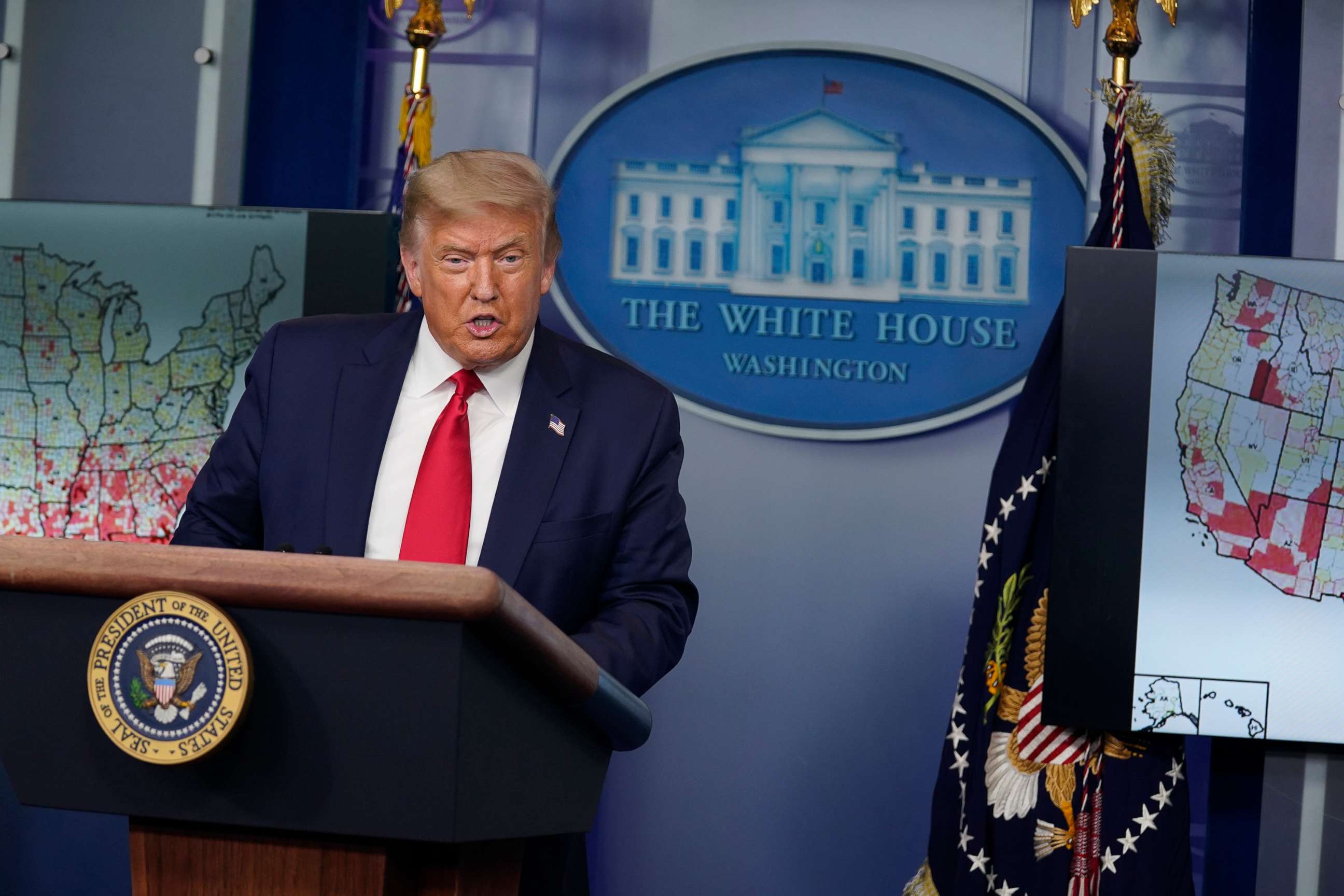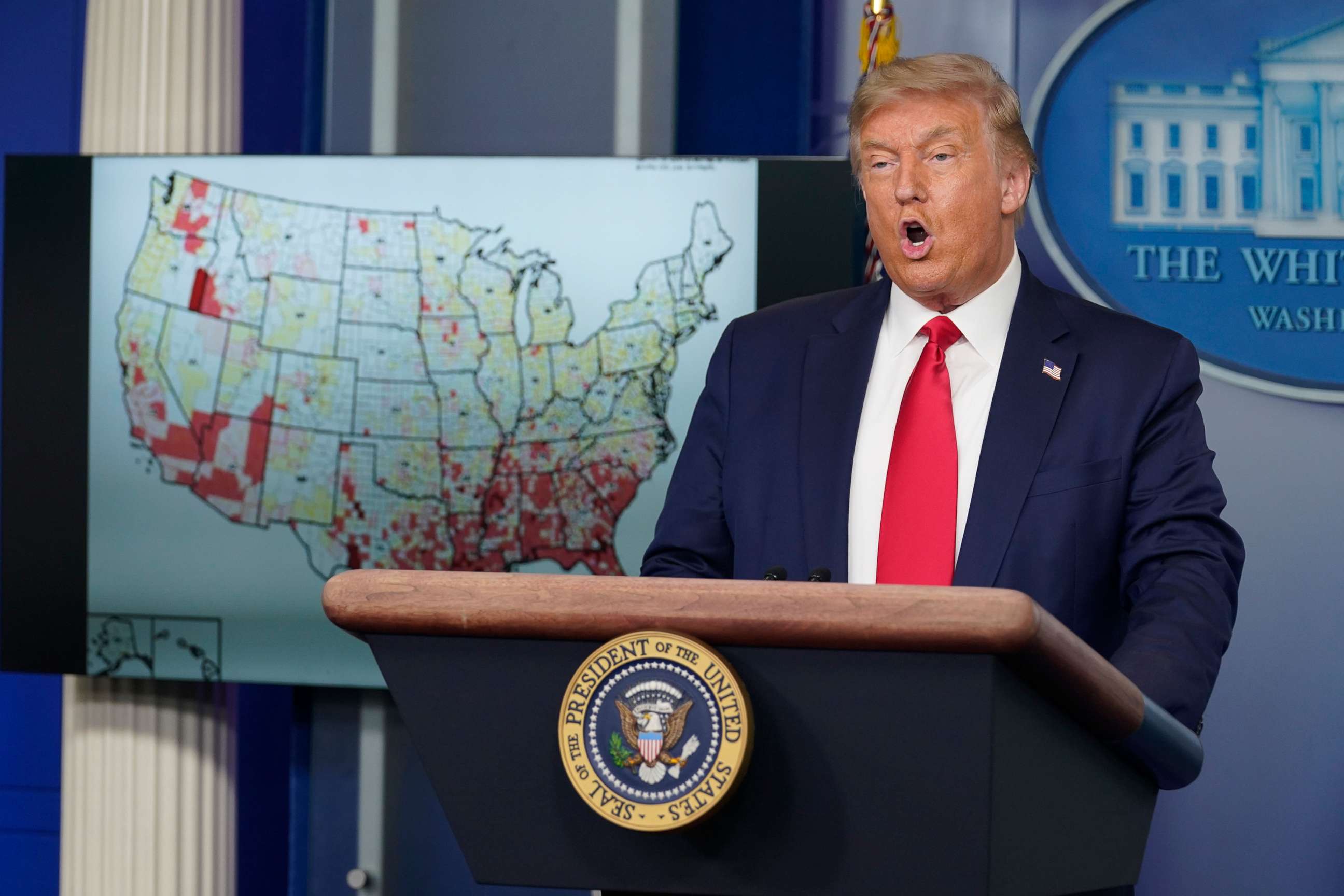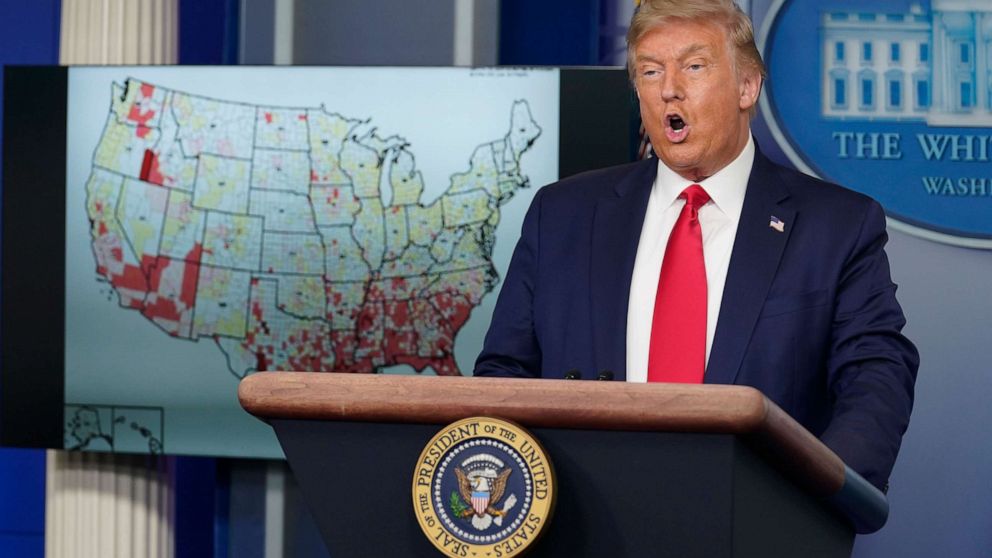Trump cancels Florida portion of GOP convention as coronavirus cases surge: 'Not the right time'
President Donald Trump announced Thursday that he's told the Republican National Committee to cancel convention events in Jacksonville, Florida, as cases of the novel coronavirus surge in the state, saying "it's not the right time."
"I told my team it's time to cancel the Jacksonville, Florida, component of the GOP convention," he said at a White House news conference on the crisis, adding the convention will start in North Carolina, "as has always been planned," weeks after cancelling most convention events there.
Back in June, Trump had demanded the Republican National Committee find another place other than Charlotte, North Carolina, for the August convention -- in large part to avoid social distancing and mask requirements.
On Thursday, Trump announced he's canceling the convention for the same reason.
"So, the delegates are going to North Carolina, and they'll be doing the nomination," he said Thursday.
"And we're going to do some other things with tele-rallies and online -- the week that we are discussing, which will be really good," Trump continued. "I'll still do a convention speech in a different form, but we won't do a big, crowded convention, per se. It's just not the right time for that."

After months of downplaying the severity of the pandemic -- pushing states to reopen and resisting modeling social distancing and mask wearing practices -- Trump said the desire to "set an example" helped drive the decision while he justified his push to reopen schools.
"It's hard for us to say we are going to have a lot of people packed in a room and then other people shouldn't have to do it," he said on the big move.
Moments after the announcement, Jacksonville Mayor Lenny Curry and Duval County Sheriff Mike Williams released a joint statement thanking the president for "considering our public health and safety concerns in making this incredibly difficult decision."
Earlier this week Williams told Politico that he had concerns about the convention being held from a law enforcement standpoint.
"It's not my event to plan, but I can just tell you that what has been proposed, in my opinion, is not achievable right now ... from a law enforcement standpoint, from a security standpoint," he said.
And in a press conference on Tuesday, Curry, a Republican, said he agreed with Williams, who expressed concern that the GOP convention -- one month away -- is "not achievable right now."
"Look, he is the sheriff of the county, head of the city law enforcement. He has many years with the (Jacksonville Sheriff's Office). He knows what he's talking about, clearly. So the position he takes that we're not prepared for this right now -- yes, I agree with him," said the mayor.
Asked if he would give his acceptance speech from the White House, Trump said that it would be announced "over the next few days."
On the topic of schools, Trump said that the additional information about reopening would be released by the Centers for Disease Control and Prevention soon, but did not go into any detail about what the CDC would issue.
"Today the CDC will provide additional guidance to reopen safely. I hope that local leaders put the full health and well-being of their students first and make the right decision for parents, teachers and not make political decisions," he said. "This is about something very, very important, this is not about politics."
The CDC released the highly anticipated guidelines a short time later.
The guidelines mostly lay out CDC evidence that children don't tend to get seriously ill and defends children returning to the classroom, citing concerns with mental health and falling behind in school.
They do not currently recommend schools conduct universal symptom screenings for students in K-12 but encourage parents or caregivers to monitor their children for signs of infectious illness every day. Additionally, the CDC still recommends kids wear masks and notes social distancing can reduce risk.

Unlike White House coronavirus response coordinator Dr. Deborah Birx, who said Wednesday on Fox News that the extent of how contagious kids are needs more study, Trump continued to insist that children who contract the virus "often have only very mild symptoms or none at all, and medical complications are exceedingly rare."
But health experts, including Birx, are concerned with children bringing the virus home.
"Even if kids are half as likely to transmit the virus compared to adults, even in that setting, it's still important because kids do play a role in transmission, and once you put kids into their natural school setting, that completely changes things," said Dr. John Brownstein, chief innovation officer at Boston Children's Hospital, a Harvard Medical School professor and ABC News contributor. "You have close proximity, poor hygiene, so that might offset their potentially lesser role and transmission."
"There's still data to support that they potentially could be index cases in a household," he said, emphasizing that there's still much to learn.
Displaying a map of hot spots behind him, Trump pointed to problems areas like the South and West and areas that have become "very clean," he said, like the Northeast. Citing that, he said again that the reopening decisions will be left up to the governors but added, in a rare concession, that those decisions should based on data and facts.
"In cities or states that are current hot spots -- and you'll see that in the map behind me -- districts may need to delay reopening for a few weeks, and that's possible," Trump said. "That'll be up to governors. The decision should be made based on the data and the facts on the grounds in each community, but every district should be actively making preparations to open."
"It will all work out," Trump said, ending his short demonstration on an upbeat note.
ABC News' Will Steakin, Terrance Smith, Justin Gomez and Anne Flaherty contributed to this report.
What to know about the coronavirus:
- How it started and how to protect yourself: Coronavirus explained
- What to do if you have symptoms: Coronavirus symptoms
- Tracking the spread in the U.S. and worldwide: Coronavirus map
Tune into ABC at 1 p.m. ET and ABC News Live at 4 p.m. ET every weekday for special coverage of the novel coronavirus with the full ABC News team, including the latest news, context and analysis.




